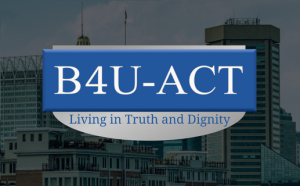One of our staff members is contributing considerably to a News Archiving service at Mu. Any well educated (Masters, PhD or above) users who wish to make comments on news sites, please contact Jim Burton directly rather than using this list, and we can work on maximising view count.
B4U-ACT: Difference between revisions
The Admins (talk | contribs) |
The Admins (talk | contribs) No edit summary |
||
| Line 6: | Line 6: | ||
B4U-ACT has authorized and promoted many studies for online [[MAP]] samples, and tends to hold a lot of sway over a study's deemed authenticity for a wider sample of MAPs. | B4U-ACT has authorized and promoted many studies for online [[MAP]] samples, and tends to hold a lot of sway over a study's deemed authenticity for a wider sample of MAPs. | ||
==2003-10 - State | ==2003-10 - State-funded nonprofit== | ||
B4U-ACT was a Maryland-based 501(c)(3) organization for seven years. While B4U-ACT currently maintains its non-profit status, Behavioral Health System Baltimore (formerly, Baltimore Mental Health Systems) withdrew its annual funding in 2010 following the death of Melsheimer ad financial cutbacks. | B4U-ACT was a Maryland-based 501(c)(3) organization for seven years. While B4U-ACT currently maintains its non-profit status, Behavioral Health System Baltimore (formerly, Baltimore Mental Health Systems) withdrew its annual funding in 2010 following the death of Melsheimer ad financial cutbacks. | ||
Revision as of 15:36, 7 October 2022

B4U-ACT is a non-profit organization whose stated goal is "to make effective and compassionate mental health care available to individuals who self-identify as minor attracted people and who are seeking assistance in dealing with issues in their lives that are challenging to them." It was founded in 2003. The organization has held workshops and hosted online forums to facilitate communication between mental health professionals and minor-attracted persons and to promote awareness and understanding of issues related to minor attraction.
B4U-ACT was crucial in the popularization of "Minor Attracted Person" as a neologism - with Richard Kramer and the late Michael Melsheimer (who co-founded the organization with mental health professional, Russell Dick[1]) being possible conduits between the minor attracted community and the mental health professionals, academics and even journalists who went on to adopt and promote the term. They had used the term "Minor Attracted Adult" in their workshops, soon adopting the person-centered version used by some online MAPs at the time, after setting up their website in 2007.
B4U-ACT has authorized and promoted many studies for online MAP samples, and tends to hold a lot of sway over a study's deemed authenticity for a wider sample of MAPs.
2003-10 - State-funded nonprofit
B4U-ACT was a Maryland-based 501(c)(3) organization for seven years. While B4U-ACT currently maintains its non-profit status, Behavioral Health System Baltimore (formerly, Baltimore Mental Health Systems) withdrew its annual funding in 2010 following the death of Melsheimer ad financial cutbacks.
During its seven-year stint as a state-funded organization, B4U-ACT facilitated six annual workshops, inviting mental health professionals and minor-attracted people to convene on neutral territory to discuss the biases, apprehensions, and other obstacles to achieving mutual understanding between the two groups. Nearly thirty minor-attracted people and sixty mental health practitioners participated over the course of seven years to address issues ranging from the difficulties of living in secret with attractions to minors, the shortcomings of forensics-based treatment programs, the public stigma surrounding minor-attraction, as well as the collegial stigma faced by clinicians who openly express sympathy for minor-attracted people. The vast majority of mental health professionals in attendance responded with an enlightened sense of compassion toward their minor-attracted counterparts, while many of the latter voiced how simultaneously liberating and terrifying it was to speak so frankly about their sexuality in mixed company, considering the lengths they routinely go to understate these aspects of their identities in everyday life.
A website, B4UACT.org appeared in 2007.
2010 Symposium
In June 2010, B4U-ACT organized a symposium to debate issues surrounding proposed revisions to the Diagnostic and Statistical Manual of Mental Disorders (DSM) entry on “Pedophilia,” recruiting researchers from Harvard University, Johns Hopkins University, Albert Einstein College of Medicine, UT Southwestern Medical School, University of Illinois, University of Louisville, and London School of Economics and Political Science. The symposium marked B4U-ACT’s crowning effort in an ongoing crusade (which included attending the 163rd Annual American Psychiatric Association Convention in New Orleans, in addition to the daily circulation of fifteen appeals written by minor-attracted people amongst members of the DSM-5 Subworkgroup on the Paraphilias for three straight months) to hold the American Psychiatric Association to its own standards of development for diagnostic criteria, specifically "Pedophilia" (i.e., drawing from a wide variety of studies and fields of science, as well as consulting stakeholders for input).
Historical parallels
B4U-ACT, and to a lesser extent, Virped have been compared to early gay rights organizations, although the comparison is probably inaccurate at this point. Their focus on medical conceptions of the Minor Attracted Person, is however evocative the early 20th Century gay underground's embrace of the medical/psychiatric consensus (namely of Homosexuals as the "androgyne"). Indeed, this brand of medicalism was visible in the early concepts for Bachelors Anonymous/The Mattachine Society, featured in Harry Hay's article.
B4um
B4U-ACT also hosts an online community known as B4um (a portmanteau of B4U-ACT and Forum, pronounced BEE·for·um). It operates as an extension of the organization, with the intention of providing a place for peer support, and fellowship between MAPs.
See also
- Prostasia Foundation
- Newgon
- Virtuous Pedophiles
- NARSOL
- Jacob Breslow - His attendance at a B4U-Act symposium is the subject of a social media controversy
External links
- Homepage
- Quarterly Review - Publication in which B4U-Act participants review recently published academic literature
- BoyWiki Article
- Some history - by Barry Casper
- Misguided Criticism - On BC, which stimulates further discussion of the org
- Slate: How can we stop pedophiles?